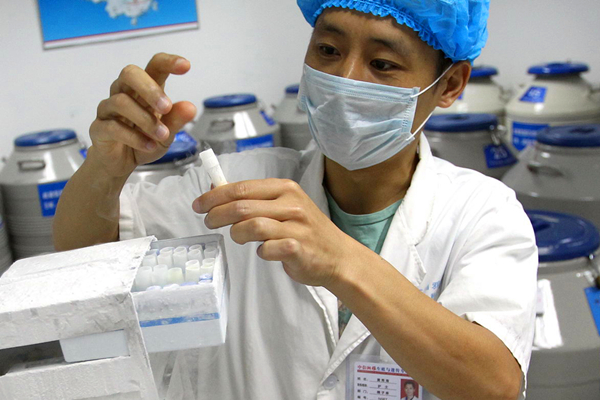Two-child policy expected to be approved by top legislature
Updated: 2015-12-21 09:54
By WANG XIAODONG(chinadaily.com.cn)
|
|||||||||||
 |
|
Sperm banks in China, like this one in Changsha, Hunan province, are seeing an increase in the number of visits by infertile couples. Zhang Wei / China Daily |
The Communist Party of China Central Committee proposed the scrapping of the current policy in late October in order to balance population growth and offset the burden of an aging population.
According to a report carried by Jiangxi Daily, a growing number of couples with fertility problems have visited local hospitals and sperm banks for consultations since the policy announcement.
Xue Jie, a head nurse with the reproductive center of the hospital affiliated with the Nanchang Research Institute of Medical Sciences, Jiangxi province, said a number of couples have come to talk to her about having a second baby with the help of sperm banks.
"Actually, there has been a rise in the number of infertile couples who have come to ask about having a second child," Xue said.
China introduced its family planning policy in the late 1970s to rein in population growth by limiting most urban couples to one child and most rural couples to two, allowing the birth of a second child if the first was a girl.
A major policy change at the end of 2013 allowed couples nationwide to have a second child if either parent is an only child. Since then, about 1.45 million Chinese couples, or 13 percent of those eligible, have submitted applications for a second child as of the end of May, according to the National Health and Family Planning Commission.
But the infertility rate is high in China, with statistics released by the China Population Association at the end of 2012 showing 40 million people have fertility issues, accounting for 12.5 percent of the population aged between 20 and 49. Many couples have turned to sperm banks for help.
Meanwhile, sperm banks are dealing with a worsening shortage of healthy sperm, despite repeated efforts to recruit more donors.
The sole sperm bank in Jiangxi, launched in 2013, has only received about 1,400 sperm donors who meet the criteria required out of more than 6,000 volunteers so far.
"Less than one quarter of donors in the country qualify," said Zhang Duanjun, a doctor with the Jiangxi Human Sperm Bank.
The current policy limits donors to men between the ages of 22 and 45, and their health records and sperm quality must meet strict requirements before they can be used for artificial insemination.
In September, a sperm bank in Shanghai launched a campaign using the iPhone 6s to attract donors. An ad promised up to 6,000 yuan ($940) for semen from qualified donors - just enough to buy the latest Apple model.
"We suggest the government change the age limit to allow more college students to participate, as they already make up the backbone of our donations," said an expert with the Human Sperm Bank in Hubei province.
Related Stories
Fatherhood the key to two-child families 2015-11-30 07:39
Ease education burden to spur two-child policy 2015-11-18 07:50
Two-child policy could start in January, official suggests 2015-11-14 08:08
Beijing expected to implement two-child policy in 2016 2015-11-10 21:38
Two-child policy to increase potential economic growth rate 2015-11-10 17:17
Two-child policy won't lead to a baby boom 2015-11-08 11:41
Today's Top News
Germany becomes AIIB's fourth largest shareholder
Spanish PM to form new govt after elections
Two-child policy expected to be approved
IMF head ordered to face trial over Tapie affair
China, Russia sign over 30 deals on Medvedev visit
Xi calls for shared future in cyberspace
China successfully launches its first dark matter satellite
China becomes shareholder in European bank
Hot Topics
Lunar probe , China growth forecasts, Emission rules get tougher, China seen through 'colored lens', International board,
Editor's Picks

|

|

|

|

|

|






